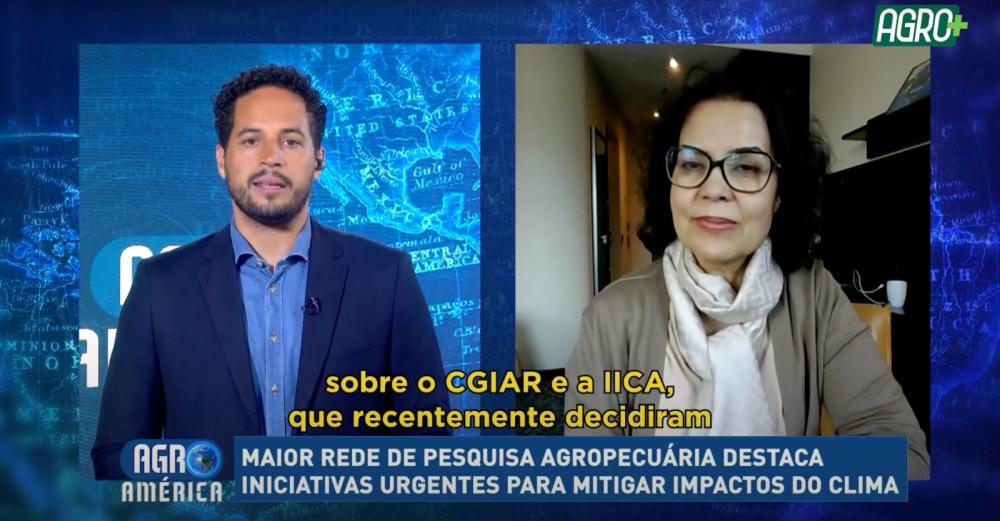“The cost of inaction is becoming increasingly expensive; the time to transform agri-food systems is now,” said Ismahane Elouafi, Executive Director of the Consultative Group on International Agricultural Research (CGIAR), in an interview with the AgroAmerica program, broadcast on the Agro Mais TV channel in Brazil and co-produced by the Inter-American Institute for Cooperation on Agriculture (IICA).

Brasilia, 4 October 2024 (IICA) – The Executive Director of the Consultative Group on International Agricultural Research (CGIAR), Ismahane Elouafi, warned that it is urgent to further advance public policies to promote the sustainability and resilience of food production.
“The cost of inaction is becoming increasingly expensive; the time to transform agri-food systems is now,” she said in an interview with the AgroAmerica program, broadcast on the Agro Mais TV channel in Brazil and co-produced by the Inter-American Institute for Cooperation on Agriculture (IICA).
Elouafi, who has participated in numerous expert panels and was a member of the Scientific Group of the UN Food Systems Summit in 2021, stressed that the key component for driving transformation is public policy, which must incentivize sustainability and resilience.
“In a worsening climate crisis, the longer we delay, the worse the consequences will be. We need public policies now that provide farmers with incentives to adopt technologies that allow them to produce more with less. What we don’t solve today, we won’t be able to solve later,” she warned.
CGIAR is the largest global network for agricultural research and innovation and has an alliance with IICA. This year, CGIAR presented its work and achievements to the Advisory Council for the Transformation of Agri-Food Systems (CATSA), a group of experts convened by IICA to seek solutions to the challenges faced by agri-food systems.
Additionally, CGIAR recently participated in organizing the third Digital Agriculture Week, which brought together various stakeholders from the world of new technologies at IICA’s headquarters, aiming to transform agri-food systems in the Americas and globally. This joint action was further strengthened last June when more than 100 international agricultural researchers attending CGIAR’s 20th annual meeting in Brasília were received at IICA’s Delegation in the Brazilian capital.
Elouafi expressed great satisfaction with CGIAR’s relationship with IICA. “Latin America and the Caribbean,” she explained, “are of enormous importance for global food production and environmental conservation. The region holds 30% of the world’s biodiversity, 30% of its freshwater, and 46% of its tropical forests, which are of tremendous value in this climate crisis. We complement each other very well with IICA, and the alliance aims to bring technologies to farmers and scale them up at the national level.”
Climate Crisis and Conflict
The expert said that the main causes of food insecurity are climate change and international conflicts.
“The way climate change is affecting food security is enormous. Less is produced, and there is also an impact on the distribution network. In 2023, international organizations pointed out that 733 million people worldwide were suffering from hunger, but the figure is even more staggering when looking at malnutrition. Nearly 36% of the global population cannot access healthy diets. The situation was already serious several years ago, and worsened with the COVID-19 pandemic, combined with climate change and numerous armed conflicts,” Elouafi said.
The CGIAR leader explained that the concept of agri-food systems is complex because it includes the production, distribution, transportation, and trade of food. She believes that the transformation must focus on ensuring sustainability, resilience, efficiency, and inclusivity.
“The impact of the climate crisis on agri-food systems is very strong,” she noted. “When we talk about a potential two-degree temperature increase, we have to think that this means 189 million more people going hungry. And if the temperature increase were four degrees, it would be 1.8 billion people. An increase of just 0.1 or 0.2 degrees already affects productivity.”
Elouafi argued that adapting to climate change must be done using various tools, such as genetically modifying plants, animals, and fish to withstand higher temperatures. She also believes that new technologies should be leveraged to shorten value chains, bringing farmers closer to markets: “We need to generate infrastructure in rural areas, for example, cold storage facilities or the use of renewable energy, so farmers can keep their produce fresh and secure higher prices in the market.”
The expert also emphasized the need to strengthen the role of technologies in reducing greenhouse gas emissions from agricultural activities: “About 30% of the world’s methane emissions come from livestock and rice production, and there is technology today that can quickly reduce those emissions by 50%. We have a project funded by the Bezos Earth Fund, carried out by our partner center CIAT in Colombia and the International Livestock Research Institute in Kenya, which seeks to genetically improve cows’ digestive systems. Forage has been tested that reduces not only methane emissions but also nitrous oxide. There are many possibilities. What we need is to invest more, but also scale these technologies to reach farmers.”
Elouafi stressed that technology is also a tool to attract young people to agriculture: “Most farmers are older; we need to attract young people, and technology is the tool for that. We have to modernize the activity, and inclusion is an important issue: we must ensure that women and young people play a leading role by accessing resources, because without them, agriculture has no future.”
AgroAmerica is a program of the Brazilian TV channel Agro Mais, part of the Bandeirantes media group, in partnership with IICA.
The program highlights the latest developments in the agricultural and rural sectors of IICA’s member countries, with the aim of promoting the exchange of experiences and discussions on challenges and opportunities in agricultural and rural development in Latin America and the Caribbean.
More information:
Institutional Communication Division.
comunicacion.institucional@iica.int











